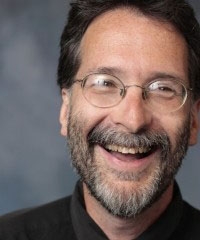The Court Where My Sons Used to Play Ball
by Brian Doyle
Is only half a court, and it’s tucked into a tiny verdant park between the library and the post office, in a dense shaggy old neighborhood, so that if you don’t know where it is, you’ll never find it, except by happy accident, which is how we found it one day when we were trundling to the library, and one son said hey dad hey a good hoop!, which is a lovely line to hear.
We stopped and explored and indeed it was a perfect little beautiful half court, with one basket, slightly too high, with a double rim, which forces meticulous accuracy on a shooter; this pleased me for murky reasons. Also the court was lined with a thick laurel hedge on two sides, so that a loose ball could not rattle away into the street or the alley, and the other two sides opened onto the park, so a loose ball would just roll harmlessly into the grass, and the court wasn’t pitted or puddled or mossy or littered with shattered glass and crumbled pebbled asphalt, and best of all there was no one on it, so my sons snagged the basketball we traveled with for just such emergencies, and they played there for an hour, that first day, as I sat in the park watching with complete and utter absorption.
There had been a time, when they were young, that I refereed their one-on-one tilts, partly as a representative of the loom of the law, and as stern defender of the sanctity of the game (no, you cannot double-dribble, or travel, or foul, even if you can get away with it, because that is not the way we play) but mostly as a chance to try to advise and applaud with muttered remarks from the hustings, but then I retired, as they entered their teenagery, and watched happily as they got better and defter and more creative and confident – as they, in fact, got better than their father had been; which was, curiously and refreshingly, a deep and abiding pleasure; I had not known that a man’s ego can be joyously washed away when his children do something better than he ever could.
But now and then many times after that first hour I watched as they spun and shot and hustled and dove, faked and hooked and blocked and boxed each other out, as they pulled up calmly from one or the other of the hedges and dropped long shots, as they baited each other into the slightly wrong move at exactly the right instant, as each grinned at a spectacular play by the other, and each hammered each other harder from affection and respect and annoyance and ambition; and then finally, when the game was over, I watched with a shiver as they gently touched fists, or brushed fingers, or just nodded in the ancient gesture that means thanks and well-played and that was fun and next time, brother, next time.
But then they grew older, and drove themselves, and now when they go to play ball they say see ya pop at the door, and I watch as one flips the ball to the other as they fold into the car; and away they go, to one court or another, still playing one-on-one. I do not think they stop at that little court much anymore; but I did, yesterday, while trundling to the library, and I said hey to the laurel hedges, to the double-rimmed basket, to the mammoth cedar tree behind the basket, and I felt nine things at once, one of which was a tremendous gratitude to basketball, which is, among its many other subtle virtues, an extraordinary way to say I love you.
Published on September 2, 2016

